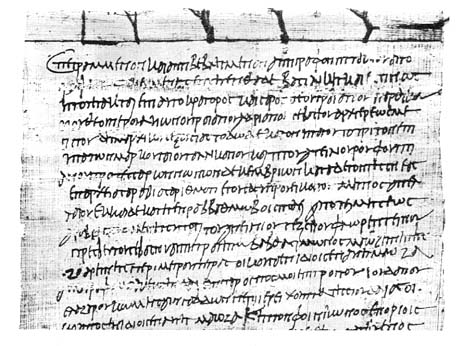
À la mode, Babatha’s document registering her En-Gedi date orchards was drawn up according to the prevalent Roman legal customs of the early second century C.E. Like the majority of her other documents, her land registration is written in Greek, the official language of government and business used in the Roman courts, not in Aramaic, the Jewish vernacular of the region, or in Nabatean, the local Arab dialect of Aramaic. Prepared in a Greek style called a double document, the information is written twice on one sheet—in shortened form at the top, and at length on the remainder. The summation in the top portion, still tied in the flattened roll in the picture, was stitched closed in the presence of witnesses, who then signed the document’s back, next to the string holes. Thus the original content of the scroll could be verified as needed, and the fuller version of the script was readily accessible if necessary. A number of similar double documents, written mostly in Greek, have been found in caves in Wadi Murabba‘at, located further north on the coast of the Dead Sea.
The most telling indication of conformity to the Roman legal system, however, comes at the end of this document. Babatha signed it, swearing by the “tuche”, which can be interpreted as the protective deity of Caesar. Though it is uncertain whether this conventional Roman oath was relayed to her in Aramaic, it is possible she would have signed it regardless, considering it religiously meaningless.
Joseph Aviram/Hebrew University and the Israel Exploration Society